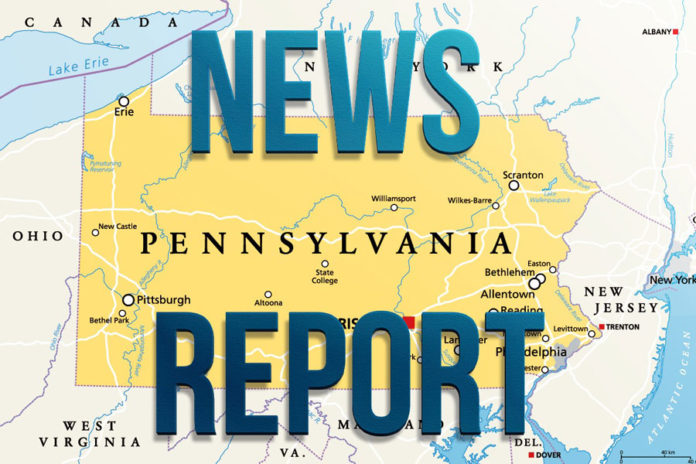Pittsburgh Tribune-Review. February 25, 2023
Editorial: The burden of Pennsylvania taxes
It’s great to make the top half of a list.
If you’re talking about public school test scores or high net income, that’s the place to be. Even on a more frivolous topic, you get a little thrill seeing your name at the head of the class.
Pennsylvania, for instance, is right up at the top when it comes to the number of colleges. It is just as prolific when it comes to hospitals. You like snacks? More pretzels are made and eaten in the Keystone State than anywhere else in the union.
But there are other honor rolls that come with less honor.
In 2019, for example, U.S. News and World Report ranked all 50 states. Pennsylvania came in at No. 40. The state where environmentalist Rachel Carson was born was 38th for natural environment. Infrastructure was 44th, which is hard to argue was unfair considering Fern Hollow Bridge collapsed three years later.
A new ranking from the Independent Fiscal Office puts sobering data on the table.
The IFO was created in 2010. It is, as its name suggests, unbeholden to party or branch of government. It offers dispassionate review of monetary information, just like the Government Accountability Office does at the federal level.
A new IFO report says Pennsylvanians shoulder a greater tax burden than other states. Specifically, the state comes in at 21st when it comes to the crushing weight on taxpayers’ backs.
It is always great to see these things highlighted and spelled out in an easy-to-read document, but let’s be honest. It’s not a surprise.
Every Pennsylvanian knows that the taxes paid are a heavy load.
We realize it every time we go to the fuel pump, where we pay more in gas taxes than any state but California and Illinois, according to the American Petroleum Institute. It is driven home hard on education and the continuing calls to find a way to fund it other than property taxes.
The state does acknowledge that food and clothing are important enough to isolate them from sales tax. And part of the tax is borne by the vices that make life fun for people who enjoy things like slot machines and table games.
Taxes are necessary in a civil society. We want roads and schools and safe drinking water. Taxes are the way that happens.
But we need government to recognize the load they are asking the people to pull — and to realize when that load is heavier than it needs to be.
And maybe they can be among the first to step up to do something about it. History says there’s probably a list of responsive governments and that Pennsylvania probably doesn’t rank that highly.
Scranton Times-Tribune. February 24, 2023
Editorial: Abandoned wells, abandoned responsibility
Many state lawmakers long ago abandoned their constitutional duty to preserve the environment by instead representing the natural gas industry.
Now, a report by the state Department of Environmental Protection reflects that legislative malpractice. The DEP found that, from 2017 through 2021, more than half of owners of “conventional” gas wells failed to report how much gas they extracted and that operators abandoned, without plugging, more than 3,000 methane-spewing wells.
Conventional wells are not those across the Marcellus Shale fields. Marcellus Shale wells are deep and partially horizontal. Conventional wells are relatively shallow and vertical.
Many state lawmakers long ago abandoned their constitutional duty to preserve the environment by instead representing the natural gas industry.
Now, a report by the state Department of Environmental Protection reflects that legislative malpractice. The DEP found that, from 2017 through 2021, more than half of owners of “conventional” gas wells failed to report how much gas they extracted and that operators abandoned, without plugging, more than 3,000 methane-spewing wells.
Conventional wells are not those across the Marcellus Shale fields. Marcellus Shale wells are deep and partially horizontal. Conventional wells are relatively shallow and vertical.
When a company fails to plug a well, the responsibility falls to the DEP — taxpayers — at a cost of about $30,000 a well. Drillers must post a bond of just $2,500 to qualify for drilling permit for a well, or just $25,000 to cover multiple wells. That provides an incentive for abandonment rather than obeying the law.
The 3,000 newly abandoned wells add to the existing inventory of about 200,000 unplugged conventional wells statewide.
Former Gov. Tom Wolf ordered the study in 2022 after he disagreed with a bill maintaining separate regulations for deep and conventional wells, which later became law without his signature. The report was released in January after he left office.
His successor, Gov. Josh Shapiro, increased enforcement when he was attorney general and campaigned on the issue. Now, he should not waste the opportunity to make sure that responsibility for pollution-spewing abandoned wells rests with operators rather than taxpayers.
Uniontown Herald-Standard. February 26, 2023
Editorial: Troubles of young people deserve attention, action
The kids are alright, The Who once sang.
Well, actually, they might not be.
Some recent studies have shown that young people, particularly teenage girls, are experiencing disturbingly high levels of stress and distress. Granted, teens have been experiencing their share of angst since the whole concept of “teenagers” as a discrete age cohort came into being. Think about James Dean bellowing “You’re tearing me apart!” in “Rebel Without a Cause” almost 70 years ago. The slings and arrows of being a teen are, to an extent, part of growing up.
But 1 in 3 high school girls having suicidal thoughts, according to the Centers for Disease Control and Prevention, is not something that should be shrugged off as a phase. The CDC also recently reported that girls in high school are experiencing levels of sexual violence, sadness and hopelessness higher than those previous generations reported. There is the possibility, researchers admit, that there is a greater sense of openness and awareness about mental-health challenges among young people than in their parents’ or grandparents’ time. They also say that girls are likely more inclined to disclose feelings of despondency while boys are more likely to bottle it up and act out aggressively. Nevertheless, the American Academy of Pediatrics and the American Academy of Child and Adolescent Psychiatry called for a “national state of emergency” in children’s mental health in 2021 and 2022, and that call should be heeded.
The causes of the problems? The stresses of the pandemic and the necessary disconnection from attending school in person when the COVID-19 pandemic was at its depths almost certainly has been a contributor, along with rampant bullying, social media and, like it or not, what students find at home – all too many young people are living in situations where they are neglected or mistreated, or they are dealing with parents or guardians who have problems with substance abuse, violence or mental health.
In other words, to paraphrase Shakespeare, the fault may not be in the stars, but in ourselves.
Kate Woodsome, a Washington Post columnist, put it this way: “Solutions start with compassionate, radical honesty: American kids are unwell because American society is unwell. The systems and social media making teenagers sad, angry and afraid today were shaped in part by adults who grew up sad, angry and afraid themselves.”
What can be done to ameliorate this? Limiting screen time is a place to start. Making sure young people have access to substance abuse and mental health services is also important. Classes where students can learn about their emotions and setting boundaries could help.
It’s a problem that shouldn’t simply be ignored.
Wilkes-Barre Citizens’ Voice. February 26, 2023
Editorial: Rozzi’s proposed rules serve governance
Pennsylvania voters told state representatives in November that they want positive change rather than the policy stagnation, polarization and cheap political theater to which they have been subjected for more than a decade.
Those voters created a Democratic majority for the first time in 12 years, albeit by the narrowest possible margin, 102 seats to 101.
Nearly two months after the House chaotically launched its new two-year session — amid the need for three special elections to determine the majority — it finally will get down to the crucial task of determining whether it will meet the public’s demand for better governance.
House rules are the machinery by which lawmakers conduct business. In recent years, they have been the leverage by which a handful of committee and caucus leaders enforced their own narrow ideological preferences over the broad public interest.
Speaker Mark Rozzi, a Berks County Democrat, clearly gets the need to use House rules to drive better governance rather than enforce ideological purity. He has proposed rules to force compromise rather than empower a handful of zealots to stymie it.
The proposal includes:
— Preventing any committee chairman or caucus official from killing legislation that otherwise has enough support for a debate and vote.
— Making committee composition more proportional, which better reflects the one-seat difference in the chamber and would prevent bills from being railroaded through committees.
— Requiring constitutional amendments to be placed on ballots statewide as referendums only in general elections. In recent years, amendment proponents have timed them for primary elections, when voters are fewer and more party-oriented.
— Mandating that constitutional amendments include only one subject. That would preclude situations like the current one, in which the Republican-controlled Senate has lumped two narrow amendments to limit regulatory power and ballot access, with a popular one to allow adult survivors of childhood sexual abuse to sue their abusers. It also would preclude using a proposed amendment as a poison pill to preclude passage of another.
— Expanding a prohibition against sexual harassment and discrimination to cover everyone rather than chamber employees alone.
The rules proposal is a template for better governance. Rank-and-file lawmakers of both parties should embrace it.
END




















